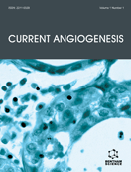Abstract
Non-small cell lung cancer is the first cause of cancer mortality in the world. Despite therapeutic improvements in the last decade, the survival rate has barely changed. Recent advances in the understanding of the signal pathways suggest an essential role of angiogenesis in the pathogenesis of NSCLC.
Bevacizumab, a monoclonal antibody against circulating vascular endothelial growth factor (VEGF), is the first approved antiangiogenic drug treating NSCLC. Many other anti-angiogenic agents are under development, including VEGF Trap and tyrosine kinase inhibitors with encouraging results, particularly triple angiokinase inhibitors, which inhibit VEGF, platelet derived growth factor (PDGF) and fibroblast derived growth factor FGF. These agents may improve the therapeutic outcomes for patients with NSCLC. Nevertheless, there is a need to identify appropriate biomarkers to select patients who are benefiting from anti-angiogenesis therapy.
Keywords: Angiogenesis, angiogenic inhibitors, Bevacizumab, NSCLC, VEGF.
 14
14

